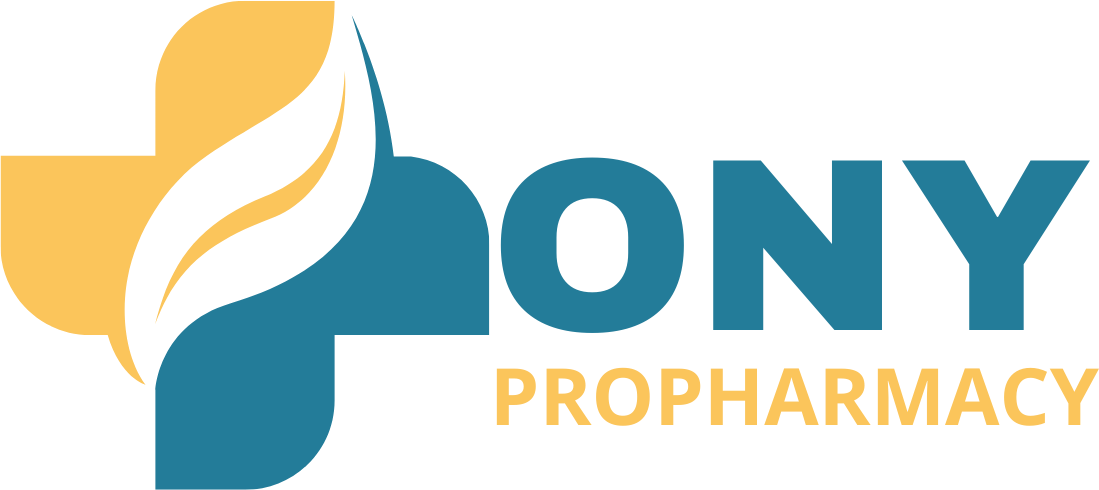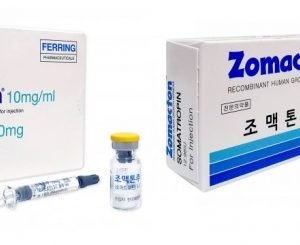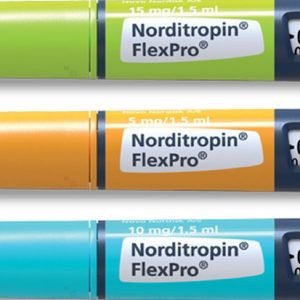Generic name: Recombinant Human Growth Hormone for Injection
Composition in effect: Recombinant Human Growth Hormone
DESCRIPTION
White loose lyophilized powder.
PHARMACOLOGY AND TOXICOLOGY
Ansomone� exerts the same actions of endogenous human growth hormone. It can stimulate proliferation and differentiation of epiphysis chondrocyte, stimulate growth of cartilage matrix cells, stimulate proliferation and differentiation of osteoblast; thus accelerate the liner growth rate and improve epiphysis width. Ansomone� can promote protein synthesis in whole body; reverse the negative nitrogen equilibrium caused by wound and surgery; correct the hypoproteinemia due to severe infection or hepatocirrhosis; stimulate synthesis of immune globin and proliferation of lymphadenoid, macrophage and lymphocyte, thus enhance the ability of infection resistance; stimulate proliferation of collagenocyte, fibroblast and macrophage in sites of burn and surgery, thus accelerate wound healing; promote synthesis of cardiocytes, thus improve cardiac contractility and reduce cardiac oxygen consumption; regulate lipometabolism, thus depress serum cholesterol and low density lipoprotein’s level; complement insufficiency or deficiency of growth hormone, regulate adult’s lipometabolism, osteometabolism, heart and kidney function.
PHARMACOKINETICS
It is reported that the equal pharmacological effect could be achieved via subcutaneous (sc) or intramuscular (IM) administration. Even though sc may lead a higher concentration of GH in plasma, IM could also yield the same IGF-I level. The absorption of GH is the relatively slow, Cmax often occurs at 3-5 hours after injection. Clearance of GH is via liver and kidney, the half-life of clearance is about 2-3hours. Uncatabolized GH excreted in urea is almost immeasurable. All of the GH in circulation system exists as a complex form with GH binding proteins that make the half-life of GH prolonged.
INDICATIONS
Ansomone� is indicated for the growth failure of children due to endogenous growth hormone deficiency (GHD), chronic renal insufficiency (CRI) and Turner’s syndrome. Ansomone� is indicated for severe burn.
More information
USAGE
When reconstitution, 1ml water for injection should be injected along the bottle wall, then swirl the vial with a gentle rotary motion until the contents are completely dissolved, do not shake violently.
The recommended dosage of Ansomone� for the treatment of children growth failure is 0.1~0.15IU/kg daily subcutaneous administration for 3 months to 3 years. Therapy regimen could be modified according to experienced doctor’s suggestion. The recommended dosage of Ansomone� for the treatment of severe burn is 0.2~0.4IU/kg daily subcutaneous administration for 2 weeks.
ADVERSE REACTIONS
Growth hormone may cause transient hyperglycemia; it can be recovered as the administration proceeded or terminated.
Adverse reactions occurred in about 1% short stature children in clinical trial. Common adverse reactions include slight pain, tingle, turgescence around the injection site and peripheral edema, arthralgias. All of those adverse reactions often occurred at the beginning of treatment, and were temporal and tolerable. Long-term and high dosage administration of hGH may develop the antibodies in a few patients. However, the antibodies concentration could be rarely up to as high as 2mg/L that might affect the therapeutic efficiency.
CONTRAINDICATIONS
1. Ansomone� should not be used in children whose epiphysis had been closed.
2. Ansomone� should not be used in cancer patients.
3. Ansomone� should not be used in patients in acute shock stage with severe infection.
WARNINGS AND PRECAUTIONS
� hGH therapy should be conducted on exactly diagnosed GHD patients under advice of experienced doctor.
� For diabetes patients, dosage of anti-glucourea drugs should be adjusted during HGH therapy.
� For patients whose GHD were caused by encephaloma or encephalic wound, the progress and the relapse possibility of potential diseases should be closely monitored.
� For ACTH deficiency patients, dosage of ATCH should be adjusted because the growth improvement effect of HGH could be inhibited by simultaneous using of ACTH.
� Thyroid gland function should be tested regularly because clinical hypothyroidism may occur to some patients during HGH therapy. For those hypothyroid, thyroid supplementation is necessary for ensuring the therapeutic effects of HGH.
� Careful consideration should be taken if claudicating occurred during HGH therapy because the patients who suffered from endocrine system diseases (including GHD) have such a tendency that their epiphysis plates of femur are relatively easy to separate.
� Growth hormone may lead to over insulin state, attention should be paid to if lower glucose intolerance appeared.
� Do not take over-dose of HGH, one time over-dose HGH administration can lead to low blood sugar and succeeded with high blood sugar. Long-term over -dose HGH administ









